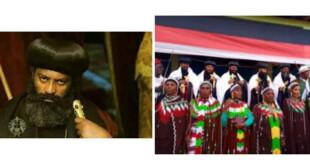The ruling coalition controls all 524 seats in Ethiopia’s parliament.
Ethiopia’s prime minister has pledged to reform the country’s one-party electoral system after pressure from German Chancellor Angela Merkel.
Merkel visited the Horn of Africa country on Tuesday at the conclusion of a three-legged Africa tour, which also included Mali and Niger. The visit came at a tense period in Ethiopia, where the government declared a six-month state of emergency on Sunday following months of deadly protests by members of the country’s two largest ethnic groups.
The country’s parliament is completely dominated by a coalition headed by the ruling Ethiopian People’s Revolutionary Democratic Front, which controls all 524 parliamentary seats along with a coalition partner.
“We want to reform the electoral system so the voices of those who are not represented can also be heard in parliament,” said Ethiopian Prime Minister Hailemariam Desalegn at a joint conference with Merkel, AFP reported. “Our democratization process is still nascent. It’s fledgling…We want to go further in opening up political space and engagement with civil society groups.”
Merkel had told Hailemariam that a “vibrant democracy needs opposition, it needs free media.” Internet access has reportedly been blocked across many parts of the country and Ethiopia’s press is severely restricted, with the country ranked 142 out of 180 in the 2016 Press Freedom Index of international NGO Reporters Without Borders.
The German chancellor also touched on anti-government protests that have rocked Ethiopia in recent months. Demonstrations began in November 2015 among members of the Oromo ethnic group, the country’s largest tribe, in relation to plans to expand the capital Addis Ababa and potentially evict Oromo farmers living on the fringes of the capital.
The Ethiopian government abandoned the plans in January, but the protests have snowballed into opposition towards brutality by the security forces. Human Rights Watch said in June that security forces had killed more than 400 people during the protests, and there have been further incidents since then.
Amnesty International stated that almost 100 people died when Ethiopian security forces used live bullets on protesters in Bahir Dar, capital of the Amhara region and home to the country’s second-largest ethnic group. Earlier in October,more than 50 people died in a stampede at a religious festival in Oromia, which protesters blamed on heavy-handedness by security forces but which the government said was due to unspecified “violent forces.”
Merkel said that the Ethiopian government should hold “open talks” with protesters and offered Ethiopian police training from the German interior ministry on the use of appropriate force in dealing with demonstrations.
Hailemariam, who admitted on Tuesday that the death toll from the protests “could be more than 500,” promised the government would do “everything in its disposal” to investigate police brutality. But he added that the country had a right to “engage with extremist violent groups in a proportionate manner,” the BBC reported.
Following the declaration of a state of emergency, Ethiopia’s government accused foreign actors including groups in Egypt and Eritrea of backing the protests, claims denied by both countries.






